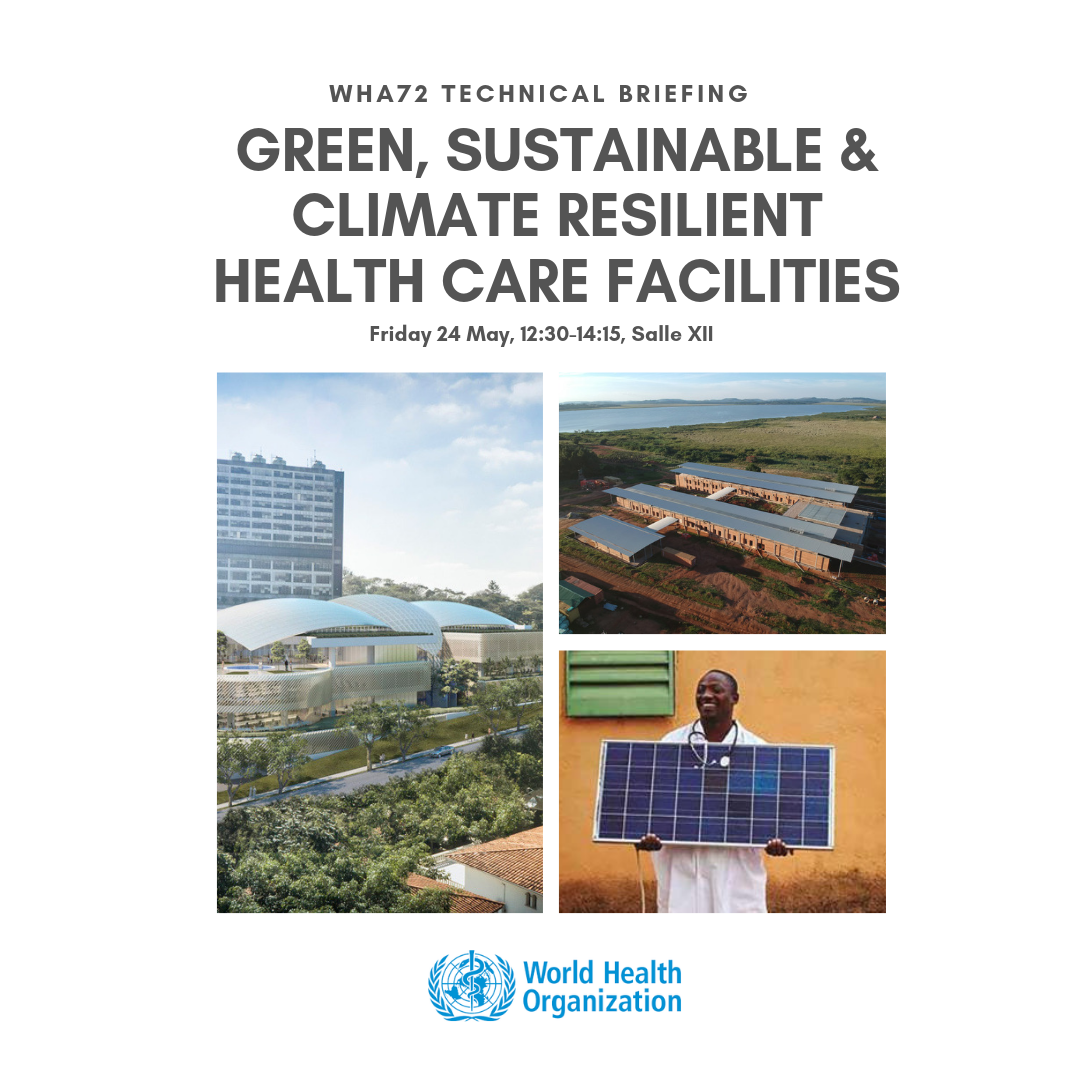Climate and Health Takes Center Stage at World Health Assembly
The 72nd World Health Assembly that took place 20-28 May in Geneva, Switzerland was a monumental one for climate and health and climate-smart health care. These issues took center stage as the WHO and ministers of health from around the world set out to discuss and resolve strategies to address climate change.
Global strategy on health, environment and climate change
The World Health Assembly approved a first ever Global strategy on health environment and climate change: the transformation needed to improve lives and well-being sustainably through healthy environments.
“This draft strategy aims to provide a vision and way forward on how the world and its health community need to respond to environmental health risks and challenges until 2030, and to ensure safe, enabling and equitable environments for health by transforming our way of living, working, producing, consuming and governing.”
"To address the challenges in health, environment and climate change, governments, society and individuals will all need to continue to rethink the way we live, work, produce, consume and govern. This transformation requires focusing action on upstream determinants of health, the environment and determinants of climate change in an integrated and mainstreamed approach across all sectors, using a public health framework enabled and supported by adequate governance mechanisms and high-level political will, tailored to the national circumstances. The health sector needs to play a new role to drive this transformation, using a sustainable and equitable approach, and socially-just transition."1
Technical briefing- Green, sustainable & climate resilient health care facilities
On Friday 24 May, the WHO hosted a high-level technical briefing on Green, sustainable and climate resilient health care facilities and the important role they play in addressing climate change. Josh Karliner, International Director of Program and Strategy at HCWH, presented at the event to discuss the opportunities that health care can take to mitigate its environmental and public health impacts, transform itself to be climate-smart and be a vocal leader advocating for climate action. Watch a recording of his presentation.

Dr. Tedros Adhonam, Director General of the WHO, spoke on the imperative of health care to adopt climate-smart strategies:
“Healthcare facilities are the operational heart of service delivery - protecting health, treating patients and saving lives. Yet health facilities are also a source of carbon emissions, contributing to climate change. The world’s health care facilities churn out CO2 through the use of significant resources and energy-hungry equipment. This is perhaps ironic - as medical professionals our commitment is to “first, do no harm”. Places of healing should be leading the way, not contributing to the burden of disease.
"The world needs health facilities that demonstrate that increasing climate change resilience and mitigating carbon emissions can be complementary, rather than competing objectives. There is so much that can be done. Health facilities can transition to renewable energy, employ energy efficiency measures, install solar panels, use rainwater tanks, implement sustainable healthcare waste management and refuse single-use plastics.
"Unfortunately, most health facilities in low- and middle-income countries lack access to reliable energy supplies. For example, 1 in 4 health facilities in sub-Saharan Africa lacks access to electricity, and many more have intermittent, unreliable supplies. “The UN Secretary-General’s Climate Action Summit this year will be an important opportunity to secure strong commitments and investments in proven interventions for climate-resilient health systems, and in air quality monitoring and policy implementation.”
WHO Civil Society Working Group to Advance Action on Climate Change and Health
On Friday 24th May, the Global Climate and Health Alliance and the World Health Organization launched the WHO Civil Society Working Group to Advance Action on Climate Change and Health. The group aims to strengthen WHO-NGO collaboration to address climate change and thus protect and promote people’s health.
Health Care Without Harm is a member of this group along with the following organizations:
- Associação Brasileira de Saúde Coletiva
- Alliance for Health Promotion
- Climate and Health Alliance (Australia)
- Canadian Association of Physicians for the Environment
- Health and Environment Alliance
- INDEPTH Network
- International Council of Nurses
- International Federation of Environmental Health
- International Federation of Medical Students’ Associations
- International Federation of Red Cross and Red Crescent Societies
- Public Health Foundation of India
- World Medical Association
1- http://apps.who.int/gb/ebwha/pdf_files/WHA72/A72_15-en.pdf
